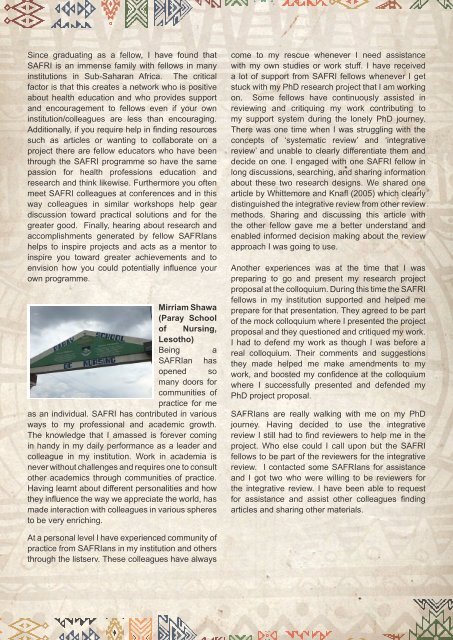10th Year Anniversary Photo Book
Our birthday book is a collection of contributions from each SAFRI graduated cohort, the hard work of the SEEK and UBER squad as well as some digging through the SAFRI newsletters and photo archives. Our 10 year journey is indeed a celebration of our individual journeys as well as the path that FAIMER and SAFRI has forged in promoting health professions education in Africa.
Our birthday book is a collection of contributions from each SAFRI graduated cohort, the hard work of the SEEK and UBER squad as well as some digging through the SAFRI newsletters and photo archives. Our 10 year journey is indeed a celebration of our individual journeys as well as the path that FAIMER and SAFRI has forged in promoting health professions education in Africa.
Create successful ePaper yourself
Turn your PDF publications into a flip-book with our unique Google optimized e-Paper software.
Since graduating as a fellow, I have found that<br />
SAFRI is an immense family with fellows in many<br />
institutions in Sub-Saharan Africa. The critical<br />
factor is that this creates a network who is positive<br />
about health education and who provides support<br />
and encouragement to fellows even if your own<br />
institution/colleagues are less than encouraging.<br />
Additionally, if you require help in finding resources<br />
such as articles or wanting to collaborate on a<br />
project there are fellow educators who have been<br />
through the SAFRI programme so have the same<br />
passion for health professions education and<br />
research and think likewise. Furthermore you often<br />
meet SAFRI colleagues at conferences and in this<br />
way colleagues in similar workshops help gear<br />
discussion toward practical solutions and for the<br />
greater good. Finally, hearing about research and<br />
accomplishments generated by fellow SAFRIans<br />
helps to inspire projects and acts as a mentor to<br />
inspire you toward greater achievements and to<br />
envision how you could potentially influence your<br />
own programme.<br />
Mirriam Shawa<br />
(Paray School<br />
of Nursing,<br />
Lesotho)<br />
Being a<br />
SAFRIan has<br />
opened so<br />
many doors for<br />
communities of<br />
practice for me<br />
as an individual. SAFRI has contributed in various<br />
ways to my professional and academic growth.<br />
The knowledge that I amassed is forever coming<br />
in handy in my daily performance as a leader and<br />
colleague in my institution. Work in academia is<br />
never without challenges and requires one to consult<br />
other academics through communities of practice.<br />
Having learnt about different personalities and how<br />
they influence the way we appreciate the world, has<br />
made interaction with colleagues in various spheres<br />
to be very enriching.<br />
come to my rescue whenever I need assistance<br />
with my own studies or work stuff. I have received<br />
a lot of support from SAFRI fellows whenever I get<br />
stuck with my PhD research project that I am working<br />
on. Some fellows have continuously assisted in<br />
reviewing and critiquing my work contributing to<br />
my support system during the lonely PhD journey.<br />
There was one time when I was struggling with the<br />
concepts of ‘systematic review’ and ‘integrative<br />
review’ and unable to clearly differentiate them and<br />
decide on one. I engaged with one SAFRI fellow in<br />
long discussions, searching, and sharing information<br />
about these two research designs. We shared one<br />
article by Whittemore and Knafl (2005) which clearly<br />
distinguished the integrative review from other review<br />
methods. Sharing and discussing this article with<br />
the other fellow gave me a better understand and<br />
enabled informed decision making about the review<br />
approach I was going to use.<br />
Another experiences was at the time that I was<br />
preparing to go and present my research project<br />
proposal at the colloquium. During this time the SAFRI<br />
fellows in my institution supported and helped me<br />
prepare for that presentation. They agreed to be part<br />
of the mock colloquium where I presented the project<br />
proposal and they questioned and critiqued my work.<br />
I had to defend my work as though I was before a<br />
real colloquium. Their comments and suggestions<br />
they made helped me make amendments to my<br />
work, and boosted my confidence at the colloquium<br />
where I successfully presented and defended my<br />
PhD project proposal.<br />
SAFRIans are really walking with me on my PhD<br />
journey. Having decided to use the integrative<br />
review I still had to find reviewers to help me in the<br />
project. Who else could I call upon but the SAFRI<br />
fellows to be part of the reviewers for the integrative<br />
review. I contacted some SAFRIans for assistance<br />
and I got two who were willing to be reviewers for<br />
the integrative review. I have been able to request<br />
for assistance and assist other colleagues finding<br />
articles and sharing other materials.<br />
At a personal level I have experienced community of<br />
practice from SAFRIans in my institution and others<br />
through the listserv. These colleagues have always


